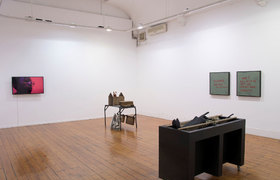‘This is not my curriculum’: Sparking a decolonial shift at UCT
22 July 2025 | Story Myolisi Gophe. Photos Born Brand. Read time 8 min.
During his undergraduate years at the University of Cape Town (UCT), a young Msakha Mona faced a simple assignment that would change the trajectory of his life. The task was to write about a playwright or theatre director who had inspired him, but the list provided was exclusively European: Shakespeare, Brecht, Stanislavski. There were no African names. None he could relate to.
“I thought, as a black child growing up in Mpumalanga and Gauteng, how do I complete this honestly?” he recalls. “I cannot claim to be inspired by these men. Their realities are not mine. What does this assignment mean for those of us who don't see ourselves in this curriculum?”
This was more than academic discomfort. It marked the beginning of a lifelong journey into decolonial thinking, language justice, and community-centred education. Years later, Mona is now a researcher, artist and educator at UCT’s Centre for Higher Education Development (CHED). He is also a founder of the Kulani Arts Project, a pioneering initiative that bridges the gap between African knowledge systems and university education through creative arts and community engagement.
Mona challenged the assignment, asking if he could write about an African playwright instead. “The lecturer said, ‘Well, not much is written about them.’ That couldn’t be true. I made an example about Mbongeni Ngema. The lecturer said that if I can find something about him, I can write that assignment.” Mona eventually found limited material, but the struggle raised a deeper question: why did he, the student, have to do the heavy lifting to locate African knowledge in an African university?
“I started thinking … If I’m struggling, what about others? What about the students who don’t have the time or energy to fight for representation? What if I have a child later who comes to this university. Do they just assimilate?”
This experience fuelled his decision to pursue a master’s in African Studies, where his research explored cultural relevance in the curriculum. The Rhodes Must Fall and Fees Must Fall movements erupted around the same time, confirming that the questions he was asking were systemic.
“If there’s poverty surrounding the university, and our graduates cannot relate to the communities they come from, have we really succeeded?”
‘An African university, or just a university in Africa?’
Mona’s critical engagement with higher education deepened when he joined CHED as a staff member. “It bothered me; that we could claim to be an African university, while being so disconnected from the communities around us.”
The question, he says, is not just academic – it’s deeply moral. “Who benefits from our teaching, our research, our resources? If there’s poverty surrounding the university, and our graduates cannot relate to the communities they come from, have we really succeeded?”
That question birthed the Kulani Arts Project, its name taken from the Xitsonga word meaning ‘growth’. The initiative uses creative practices – storytelling, music, oral traditions – to engage communities in ways that resonate with their lived experiences.
“As a social scientist and an artist, it made sense. Our communities have always used arts to teach values and histories. That’s not entertainment, it’s education.”
The project particularly centres the experiences of youth whose backgrounds make them less likely to access formal higher education, but who carry rich cultural and intellectual resources of their own.
A critical component of the project is language justice. Working across eight South African languages, Mona is a member of UCT’s Language Policy Committee and of the South African National Commission for UNESCO.
“Our assessment systems are largely in English. But what happens when you speak to children in their own languages? They become confident. They want to tell their stories.”
He’s seen first hand how young people – often dismissed as ‘at risk’ – become eloquent, curious and expressive when given the right tools and linguistic freedom. “These are philosophers,” he says. “But our systems don’t see them that way.”
Partnering with communities, not just performing for them
Kulani’s strongest partnerships are community-based. The project collaborates with various entities; one of them is an NPO that runs life centres in Mpumalanga, where children aged three to 18 come for support, learning, and creative play. Many of these children face harsh home environments, but at the life centres, they thrive.
Throughout the year, the Kulani team runs storytelling sessions and performance workshops. Their flagship annual event, Echoes from the Caves, held during Africa Month, offers a platform for youth to showcase what they’ve learned at these workshops.
“This year, the children were the stars,” says Mona proudly. “They performed, they handled media interviews, they told their stories. They weren’t framed as victims. They were knowledge holders.”
The project aligns strongly with UCT’s Vision 2030, which centres excellence, transformation and sustainability. While UCT has several community based projects, with the Social Responsiveness arm of Vision 2030 driving community service, Mona feels more needs to be done.
“Inclusivity isn’t just for the people who make it to UCT. What about those who never will? If we’re serious about transformation, we need to take the university to them, not wait for them to come to us.”
Excellence, too, must be redefined. “We’re not getting paid to do this work. Most of our time is spent raising funds so kids can get to the venue. But this is excellence. These are the values we should be instilling in our graduates.”
From the Radio to the Stage: Growing the Impact
This year, the project partnered with the SABC radio station Ligwalagwala FM to broadcast the performances and amplify the children’s voices. “It’s powerful. These are children who are now reflecting on the heritage of gumboot dancing, migrant labour, and African identity – on national platforms.”
But Mona is quick to emphasise that Kulani is not a ‘charity case’.
“UCT benefits too. We get to see what community-based knowledge systems can teach us. We get to test our theories in the real world. We get to bridge the university and society.”
The project is now exploring ways to bring its model to the Western Cape. A previous collaboration with the Baxter Theatre showed promising results, and there are plans to host future ticketed productions for which proceeds could go towards student debt relief.
“There’s interest; but of course, it depends on funding. We’re open to partnerships, but only those that respect the dignity of the community. This isn’t a photo op. This is real transformation work.”
“Education should be a social good. Not everything has to be monetised. Sometimes, we need to act simply because it’s the right thing to do.”
Having completed his PhD (also on decoloniality and education), and awaiting the September graduation, Mona is already thinking about the next stage of Kulani’s growth. But at its heart, the mission remains the same: to make education meaningful for all, not just for the privileged few.
“Education should be a social good. Not everything has to be monetised. Sometimes, we need to act simply because it’s the right thing to do. We’re not doing this for attention. We’re doing this to restore dignity. And if UCT is truly an African university, then it should be a home for initiatives like Kulani – initiatives that take African knowledge seriously, that include the excluded, and that teach us new ways of being and of learning together.”
 This work is licensed under a Creative Commons Attribution-NoDerivatives 4.0 International License.
This work is licensed under a Creative Commons Attribution-NoDerivatives 4.0 International License.
Please view the republishing articles page for more information.
















